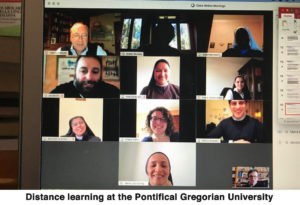Dear Friends,
We are in a very different place now than we were a month ago, as the corona virus pandemic has exploded all over the world and we have become acutely aware of the terrible threat it poses to our life and health, as well as our social and financial well-being.

Italy, as you have no doubt heard, has been the hardest hit, with more recorded deaths even than China. Since the focus of our mission is there, we have been especially concerned about their welfare and have kept in close touch. In this newsletter, we provide several oral, visual and written accounts of what is happening in the schools and communities there.
The Gregorian and its related institutions have been shut down physically for some time; but their teaching has continued, as they have been able to shift successfully to online classes. Moreover, faculty who are directing theses for licentiate and doctoral degrees are continuing to work with their students remotely. In spite of all the challenges, this sudden and radical transformation has gone remarkably well, due to the dedication, creativity, hard work and good will of all involved. The change has in many cases prompted the faculty to rethink their approach to teaching and learning and adopt a more student-centered approach.
The Jesuit communities in Rome, including those at the Gregorian, the Biblicum and the Orientale, have been confined to their buildings and must make due with limited resources and without any staff support. Fortunately, no one has been infected yet as far as they know; but their lives have been severely restricted. In the face of these hardships, the community is adapting and carrying on its common life with its usual dedication, charity and good will. As the interview below with Fr. Gerry Whelan, SJ indicates, they have found a deeper sense of prayer and solidarity in this time of enforced “retreat.”
Their experience points to a deeper truth about times of crisis and loss. As terrifying and difficult as the current situation is, if we face it with trust in God and care for one another, we will find the light of God’s merciful grace there and come through better than we were before. Even the Black Death, which began in the Middle Ages and lasted for centuries, decimating the population of Europe and wiping out whole cities, in spite of the paralyzing fear and division, unleashed many beautiful expressions of religious faith, heroism, sacrifice and creativity, under the inspiration of Church leaders such as St. Charles Borromeo, a great friend of the Jesuits, and St. Aloysius Gonzaga, the young Jesuit who studied at the Gregorian before he died ministering to plague victims.
Times such as these confront us with our own weakness and vulnerability as we face both the destructive forces of disease, poverty and social breakdown without, along with the even more debilitating ignorance, self-seeking, prejudice and animosity within. Yet if we acknowledge these with humility and honesty and refuse to give in to them, we will find God’s redemptive power at work, helping us overcome these dark forces and uniting us in mutual love and support.
Dr. John DeGioia, President of Georgetown University, in his March 23 update to the community spoke very movingly about the centrality of the “common good” to the Jesuit mission. He pointed out how St. Ignatius himself, in the Formula of the Institute, cited the common good, along with the greater glory of God, as the fundamental purpose of Jesuit ministries. Dr. DeGioia quoted from Cicero’s De Officiis, which, according to the revered Jesuit historian Rev. John O’Malley, SJ, was the source of Ignatius’ understanding of the common good:
We are not born for ourselves alone. We as human beings are born for the sake of other human beings that we might be able mutually to help one another. We ought therefore to contribute to the common good of humankind by reciprocal acts of kindness, by giving and receiving from one another, and thus by our skill, our industry and our talents to bring human society together in peace and harmony.
That is a good blueprint for all of us to follow as we seek to rise above the soul-killing fear and isolation of this moment and unite ourselves with God’s redeeming work in our world.
Just like everyone else, we at the Gregorian University Foundation have been impacted by the pandemic and the reactions to it. Those of us on the staff have been working from home and meeting virtually. We will not be traveling for a while, which will inhibit our outreach efforts, which are such an important part of our current operational plan. We have had to cancel a number of events we had planned in various places around the country, and will no doubt be cancelling future ones. We are therefore pursuing other ways of keeping in touch with our friends and supporters and trying to engage new ones.
Fortunately we were able to get some worthwhile trips in before everything started closing down. Fr. George was in Florida, as you will see below, and had several very productive meetings and events. I was able to visit New York, New Jersey and Florida in late February and early March. These trips proved to be very fruitful, in spite of the uncertainties and changes that affected some peoples’ availability. Our trustees and other supporters have been very helpful in setting up and hosting events and inviting colleagues and friends who are new to us. We have also been using our own connections to make new contacts. What we have found is that when we can get in front of people and explain the work of the Gregorian University and the Biblical and Oriental institutes and the impact they have, people are very impressed and interested in helping out; but it is still amazing how many people, even those who have been very involved in various Catholic institutions and causes, know little or nothing about the Gregorian. We still have a lot of education and evangelization to do in order to build the support our institutions so desperately need.
Both in our recent travels and in our current sequestration, we are aware more than ever of how dependent we are on the good will, generosity and hard work of all of you, our friends and partners in this important mission in service of the universal Church. We need your help to get the word out about the great work being done at the Gregorian, to reach out to and engage new supporters and to provide the resources needed to sustain and expand the Jesuit mission of forming the next generation of leadership for our beloved Church, so that it can bring the graces of Christ’s merciful redemption and the riches of our tradition to bear on the needs of our beautiful but suffering world.
Michael C McFarland, SJ
President, Gregorian University Foundation



